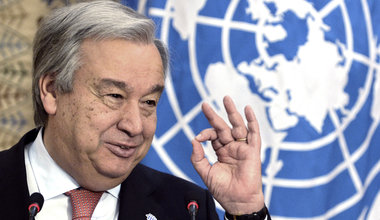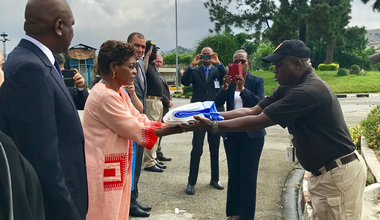UNOCI trains 35 journalists on crisis resolution process and the fight against HIV/AIDS
Divo, 29 September 2009... The United Nations Operation in Côte d'Ivoire (UNOCI) on Tuesday, 29 September 2009, started a workshop of reflection and exchanges in Divo on the topic: "The role of the journalist in the crisis-resolution process and his/her contribution to the fight against HIV/AIDS". Some 35 media professionals from Tiassalé, Lakota and Divo are taking part in the two-day workshop, which is aimed at sensitizing the media on the impartial processing of information in order to contribute to a calm electoral environment.
The head of UNOCI's Public Information Office, Hamadoun Touré, highlighted the importance of the media as unavoidable partners of the UN Mission in the crisis-resolution process. "UNOCI takes a particular interest in journalists' contribution to the peace process," said Mr. Touré, who is also the spokesman of the Mission. "For the UN Mission, working with the media is just as essential as the efforts deployed at the political, electoral, diplomatic and military levels to help in the restoration of a definitive peace in your country," he told participants, before adding that no peace process can succeed without substantial support at the information level.
Mr. Touré stressed the role of journalists in the establishment of a calm electoral environment. He reminded them that the awareness-raising that they had done during the mobile court hearings, the identification and voter registration operation, and the data processing had contributed to the success of these different operations on a national scale.
Turning to the contribution of journalists to the fight against HIV/Aids, Mr. Touré stressed that they had an important role to play in the efforts aimed at ensuring universal access to prevention, treatment, care and support services related to the disease.
The Mayor of Divo, Assé Badja Camille, welcomed the holding of the workshop in his locality. Addressing the journalists, he underlined the importance of respecting ethics and deontology: "By using true and credible information, you will contribute to the success of the process in which we are involved. The election period is decisive and cannot accommodate any unnecessary sources of tension because the whole world is looking at us and we have to show our capacity to overcome our differences," he said.
The deputy prefect of Divo, Zébé Tétiali, urged journalists to process information in an objective way, in order to allow Côte d'Ivoire to definitively resolve its crisis. "You just have to be content with facts and not give opinions. You have to write in order to inform objectively and not write in order to stir up tension," he insisted. He reminded participants about the basic principles of journalism before declaring the training workshop open.
The workshop gave participants and trainers a forum to discuss various topics, namely "The role of Ivorian media in the crisis-resolution process in Côte d'Ivoire" and "The contribution of journalists to the fight against HIV/AIDS". The part HIV/AIDS section of the workshop was included following a request from members from REPMASCI of Sud Bandama.
Within the framework of its efforts aimed at involving the media in the Ivorian peace process, UNOCI has organized more than 16 seminars, spread over the whole country, around various topics, including "The management of information in electoral period", "The coverage of the electoral process" and "Community radios and citizen education in electoral period", between June 2007 and May 2009.
 UN
UN United Nations Peacekeeping
United Nations Peacekeeping



